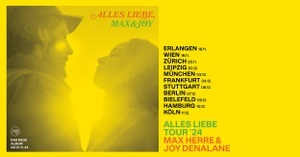LAMBERT / Deutschland
In the organizer's words:
LAMBERT: ACTUALLY GOOD
When LAMBERT was caught playing the piano by his daughter one morning in his Berlin apartment, he realized that he had to change something. "You always do the same thing," she opened and stared icily at her father, who was fortunately able to hide his reaction to this drumbeat behind his ever-present mask. "You'll soon have no career if you carry on like this." He had always been content to make music "like this", from his self-titled 2014 debut album for the cult label Staatsakt to Open from 2022, his fourth album for Mercury Records, after all, he had become so well known in his home country that he could easily perform as a headliner at the Elbphilharmonie in Hamburg or the Funkhaus in Berlin. He had also explored different genres, including the jagged electronica of False (2021) and of course jazz, his first musical passion, on the albums All This Time and Live In Amsterdam from 2023. But the fact that his now 14-year-old daughter, who had grown up with his quiet, contemplative compositions and had never complained, suddenly reacted in this way made her comment all the more shocking. What if there was some truth to her wild claims?
Crushed by her harsh criticism, which hit him harder than any he had received before, LAMBERT questioned everything he knew about his artistic identity. However, as he fished around for answers to almost unanswerable, even ridiculous questions, he realized that there was already an ideal solution; a project he had been thinking about for some time. He had been invited by an English director, who for reasons that will become clear, one of which is the filmmaker's residual dignity, we will simply call Matt, to contribute the score to his first television series. An unexpected additional proposal had also recently arrived: He wanted to book him, the director said, not only as the composer but also cast him as the detective in this gritty crime drama about the true story of the infamous and still unsolved "Ice Cream Man Murders" that kept the kingdom on tenterhooks in the early 2000s.
"It was the production team who originally asked me to be the composer," says our junior Til Schweiger in the interview: "But when Matt saw this strange guy in the mask, he thought: 'That's who we need for this story!' I had held back because the idea seemed strange to me, especially for a German musician, but now I thought: 'Becoming a detective in an acclaimed English TV series doesn't sound so bad'. Anyway, my daughter said I should 'expand the Lambiverse' and the more I thought about it, the more I liked the idea of trying out a different mask. So thanks to her, I decided it was time to take the bull by the horns, or so they say."
LAMBERT had already read the script, of course, and appreciated the director's intentions: "He knew all about 'Tatort' and, like my parents and grandparents, he had seen all the Edgar Wallace films. He also raved about these English series like Lovejoy, Rosemary and Thyme and even Bergerac. I didn't know them, but he sounded very passionate and called them 'the canon'. At least I think it was 'the canon'. 'Canon' wouldn't make sense. Unless he was talking about the camera. Or he said 'cannon'. Which means cannon and doesn't make sense either. Anyway, English is not my first language, but Germans like crime fiction, so I thought, 'Why not? Let's do it!' It was probably the worst decision of my life."
The series was to be aptly titled The Stranger, and due to scheduling, LAMBERT wrote the soundtrack before filming began. As a result, the album recordings had already been completed and arranged in a dramaturgically coherent order when he arrived on set: the haunting, intimate title track opens with rolling piano arpeggios and the quietly accented cello of Marie-Claire Schlameus, followed by the idiosyncratic "The Move" with its staccato synthesizers and the more formal "Don't Know Anyone", to which Ralph Heidel contributes a saxophone. We hear the multi-layered but playful "Pressure And Room" ' as well as the contrasting bucolic innocence of "The Others", where Robin Scherpen's acoustic guitar takes center stage. "Maybe The Future", on the other hand, showcases the optimistic charm of Francis Lai's underrated Bilitis soundtrack, while "Four Walls One" returns to solo piano before "Drama And Comedy" marries tension and elegance at eye level. After the spirited "Rather" and the undeniably redemptive "Happy Place" have faded away, "How It Ends" - final album track and reserved for the film's closing credits - offers a final welcome opportunity for the reflection that such an immersive cinematic experience demands.
Once LAMBERT reached England, however, and eventually the vacant courthouse near the Thames where much of the action would take place, it became clear that things would not go as smoothly as they did when composing the score. "He's a very strange guy, this Matt," says the musician, "and I'd never met him in person. I'd spoken to him beforehand, of course, and he'd sent me some goodies to convince me - salted caramel M&Ms, limited edition, proper - but by then my daughter had made her point and I'd decided I'd like to be in front of the camera. Anyway, in England everyone is called Matthew Matt. That's quite normal. I know that, even as a German. But the very first time I said that, he freaked out, like, 'My name is Matthew! My name is Matthew!' So that was quite a surprise. Not that I was paying attention."
Within a few hours - as LAMBERT has already reported in "Lambert Klamra Jazz", his weekly podcast with fellow musician Felix Weigt alias Gregor Klamra - the situation escalated completely. "In the first scene, he seemed unhappy because he didn't like a bench. He started shouting again: 'Why is there a bench there? Is this a fucking viewing platform?!' There was also a guy who was supposed to play the part of the killer who wasn't a professional either. He had been promoted by the crew because Matt liked the way he looked, but then he decided he really couldn't act. Matt gave him a hard time and the atmosphere affected everyone. When someone starts shouting in a work situation, it's never good. It's never good. And it didn't take long for me to realize that he regretted hiring me, too. I think he felt that the focus would be on LAMBERT and not on him, the director, you know? He was worried that I would draw all the attention to myself, which is funny. Everyone knows I hate attention. Why else would I be wearing a mask and always giving false leads?"
One of the scenes that most appealed to LAMBERT was a car chase, an idea he had always wanted to realize. "Every thriller has one, doesn't it?" he laughs. "I love car chases! Who doesn't? Since it was in the script, I was really looking forward to it. But when I arrived on set, he had changed his mind. He was shouting things like 'We have to think outside the box!' I think he had just misjudged the budget. They had spent a fortune on ice cream. We ended up riding around on scooters and I broke a rib. True story. They didn't even have money for a stuntman. If we'd done the car chase, nothing would have happened! It's all effects!"
To be fair, he might have fared better if he had been wearing a helmet too, but the strict British health and safety laws didn't matter to Matt as he had adapted LAMBERT's character so that he could continue to wear the mask he has worn throughout his career as a musician. So it was impossible that anything else would have fitted on his head. But as is usual with such injuries, it takes time to really notice them, he stayed on set for another 24 hours until the pain became unbearable, only to become embroiled in another argument. "Matt kept saying that my commissioner represented 'the truth' and that whatever happened, I had to project that 'truth' to the audience. Then he started shouting. 'What is 'the truth'? What is 'the truth'? No one knew what to think. What kind of question is that? I definitely don't know what 'the truth' is, you realize that."
To make the whole thing literally even more painful, the director didn't even realize that his leading man was hurt and gone, so our would-be commissioner decided to lay low and let it go. He was through with it. The only concern he had left was to save the music for publication. And so, lacking the "sitting flesh" to deal with the director any further, he left his hotel as quickly as possible and returned to Berlin. The two artists never spoke to each other again. And The Stranger was never completed. In fact, Matt never paid LAMBERT's fee either. Not that this would have affected any long-term ambitions. "I'd still love to do another movie," says our incognito virtuoso with a laugh. "It's fun to be someone you're not."
Eighteen months later and ten years after LAMBERT's debut album, The Stranger's - now renamed - film score is finally ready for release under the title ACTUALLY GOOD. Inevitably, untangling the complications involved took some time and ultimately even forced LAMBERT's manager to file lawsuits, which Matt was unable to compete with, thanks in part to Brexit. "Serves him right," LAMBERT adds. "I think he voted for it." In the meantime, LAMBERT set to work making sure that everything that was released wasn't just more of "the same", to quote his daughter again. As we now know, this was all Matt had really wanted.
In an unexpected twist, Lambert's team even managed to steal some of the footage to use for promo videos, even managing to create a remarkable mini-documentary in the style of Werner Herzog's My Best Friend or Terry Gilliam's Lost In La Mancha. Directed by Tom Oxenham, who was present during filming, it traces the genesis of this swiftly ended crime disaster, not to mention the extraordinary turn that real life took. What remains? The most important thing, namely this album and the long overdue opportunity to listen to it as LAMBERT actually meant it. "At the end of the day," says our masked maestro, "the music was completely distorted by that damn director, and I needed something more cheerful, not this typical 'Scandi-noir' shit. I worked on it until it was the way it should have always been and I'm really happy with it. My daughter loves it too. The Stranger may be shit, but the music is ACTUALLY GOOD."
This content has been machine translated.Price information:
VVK: 25 € + service and VVK fee / AK: 30 € / seat











